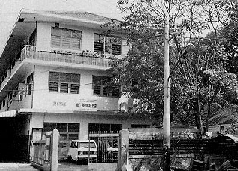 Prominent writer Pramoedya Ananta Toer, dubbed Indonesia's Albert Camus, was buried at a Jakarta cemetery Sunday afternoon, attended by family members, close friends and admirers of his works. Pramoedya died a few hours earlier at 81 after suffering from diabetes and other health problems.
Prominent writer Pramoedya Ananta Toer, dubbed Indonesia's Albert Camus, was buried at a Jakarta cemetery Sunday afternoon, attended by family members, close friends and admirers of his works. Pramoedya died a few hours earlier at 81 after suffering from diabetes and other health problems.Daughter Tatiana told Kyodo News her father died at 8:55 a.m. He had been receiving treatment at St. Carolus Catholic Hospital in Jakarta for three days before asking to go home Saturday afternoon.
"He died peacefully with his children, best friends and journalists who knew him personally at his side," she said. "He was a man with great dedication, not only for the world of literature, but also for the country he deeply loved."
Pramoedya died while in the process of completing an encyclopedia, a last work that had kept his spirit strong during his prolonged illness.
The eldest of nine children of a school teacher in Blora, a town on the northern coast of Central Java, Pramoedya fled to Jakarta when Japanese troops marched into the town during World War II.
When the nationalists declared independence in 1945, he joined the People's Militia to fight the Dutch, but was caught in a police sweep and spent most of the next two years in Bukit Duri, a Dutch prison camp.
It was during this first prison stint that he wrote his early novel "Perburuan" (the Fugitive), the story of 24 hours in the life of a guerrilla fighting the Japanese.
Pramoedya's books were banned by the Suharto regime, which believed him to be involved with the People's Cultural Institution or Lekra, a pro-communist group of writers and literary critics who launched a campaign in the 1960s against those whose views did not conform with their own.
He was arrested in 1965 following an abortive coup blamed on the Indonesian Communist Party, PKI, and held at Salemba detention center in Jakarta.
Pramoedya, who said his recipe for health was eating raw garlic and smoking 48 cigarettes a day, was later interned for 10 years at a penal camp on Buru Island in eastern Indonesia.
A candidate for the Nobel Prize in literature on several occasions, Pramoedya was released in 1979, but by then many of his works had been banned in Indonesia for what the government deemed their communist and Marxist theories.
With the collapse of Indonesia's authoritarian Suharto regime in 1998, Pramoedya's books are now available in bookstores throughout the country.
Yet although four different governments have ruled Indonesia since Suharto's demise, the ban on his books has never been officially lifted, leading some bookstore owners to remain prepared for the "book sweeps" common under Suharto.
Some of his works were even banned under the liberal government of President Abdurrahman Wahid.
Some of Pramoedya's best-known works originate from his years in jail. While at the Buru Island prison camp, he reconstructed writings he had been working on before imprisonment on turn-of-the-century Indonesia and the emergence of anti-colonial movements.
He was awarded the Grand Prize at the 11th Fukuoka Asian Culture Prizes 2000 for his masterpiece, "The Buru Tetralogy," a set of four novels he wrote while imprisoned on Buru Island, based on recitations to fellow inmates to keep their spirits up.
Judges of the Fukuoka Asian Culture Prize called him "one of the truly great writers of Asia."
One of Pramoedya's books, "Bumi Manusia" (This Earth of Mankind), tells the story of Minke, a young Javanese nationalist who dreams of becoming a writer, but ends up suffering punishment from the colonial authorities for his relationship with a mixed-race girl.
His other books include "Keluarga Gerilya" (Guerrilla Family), "Gadis Pantai" (The Girl from the Coast) and "Tales from Djakarta", which was published as a scholarly journal by Cornell University.
Though the U.S. Embassy saved its copies of Pramoedya's works from being purged during a sweep of "communist" books launched by Islamic youths in 2001, Pramoedya was critical of the United States.
In 2002, in the last of several interviews he gave Kyodo News, Pramoedya said terrorist acts against the United States were to ridicule the country, because "America is too arrogant, the whole world is forced to listen to its words."
"History has proven that a superpower, from whichever level it grew from, can be ruined -- or ridiculed -- by a little power. It has been proven. This is a warning to the superpower not to underestimate the little powers," he said.
He said attacks against the United States "were a warning, and it remains a problem in relation to human proliferation. A male rat and a female rat were kept in a room. When they had babies, they loved them. But as time passed, and the number of rats increased, they began eating each other."
In the interview, he dreamed of a world seized by a "people's globalization" to take back power that has become concentrated in the hands of a few in a world controlled by capitalism through globalization.
"There should be a people's power movement, not only in one country, but around the world, to address that," he said.


No comments:
Post a Comment